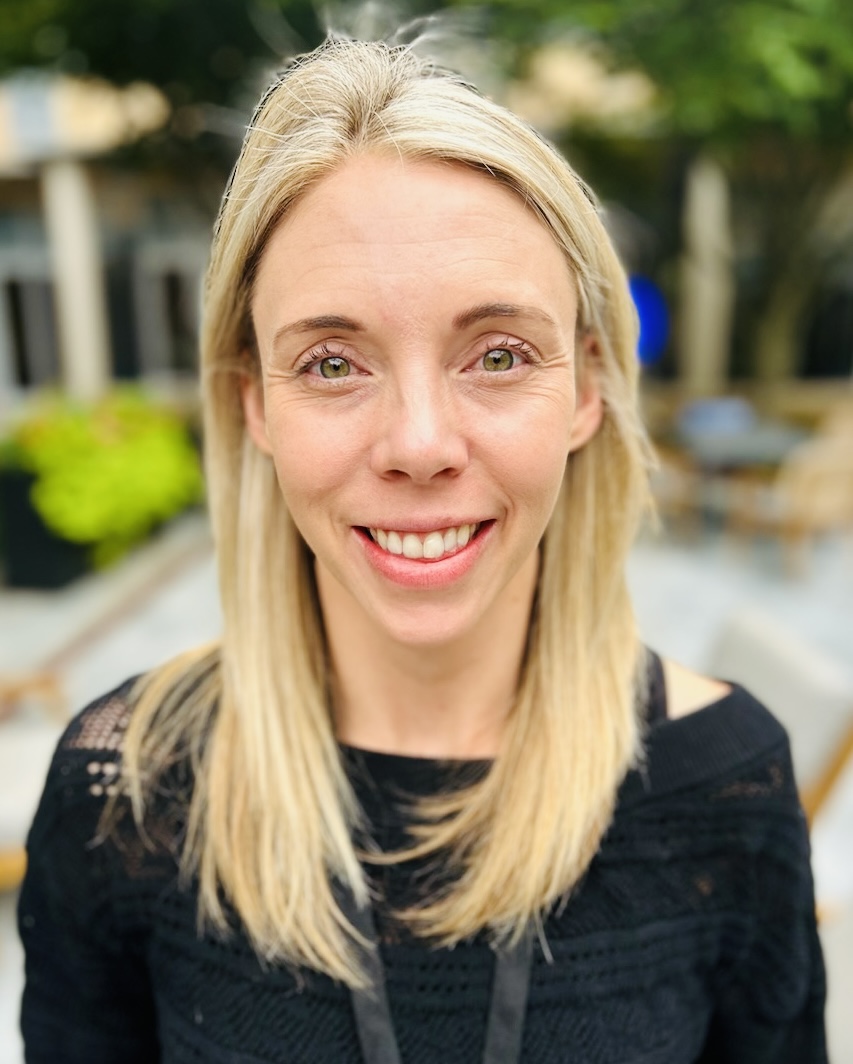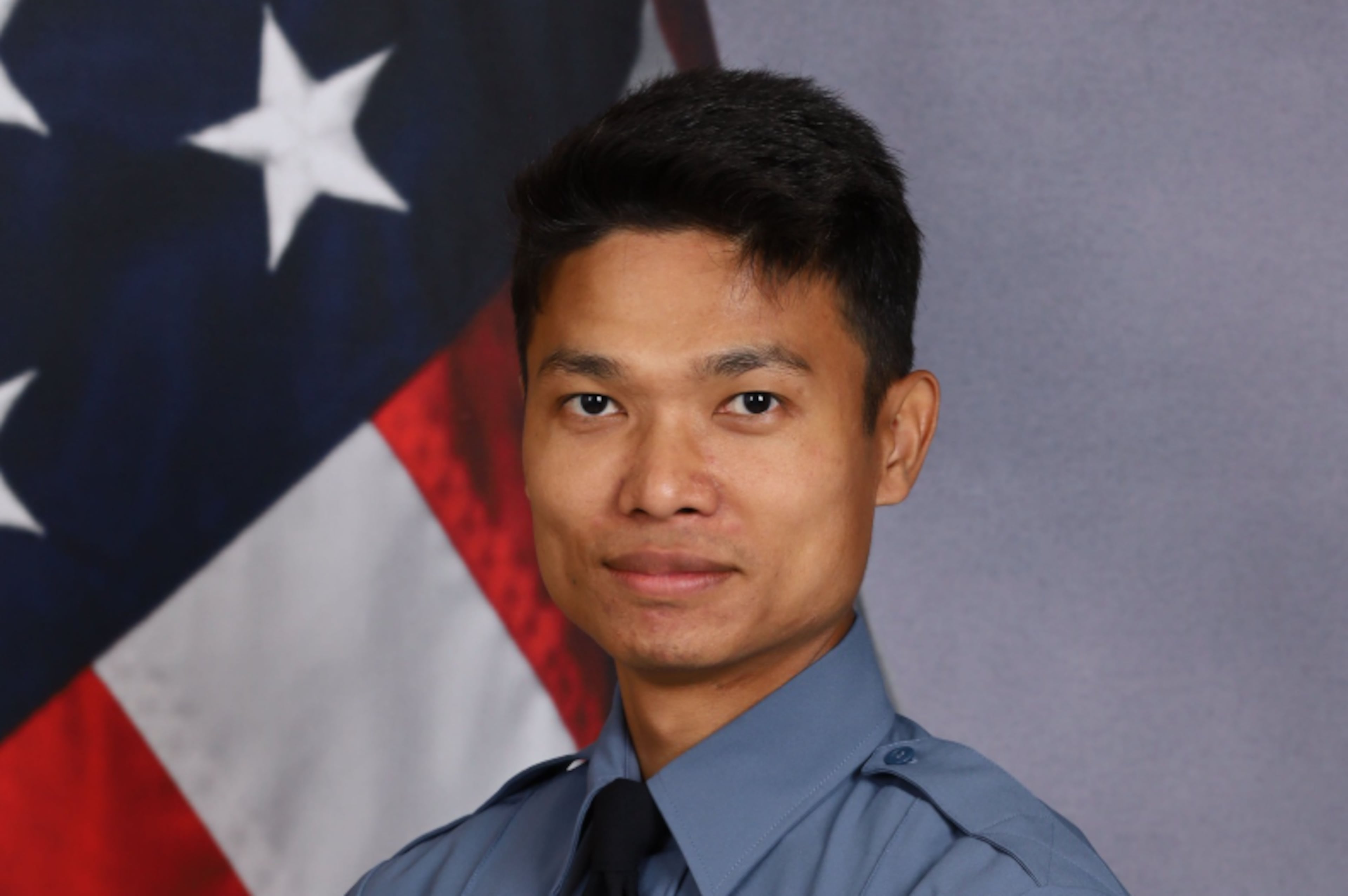Meet some faces in the crowd at Atlanta’s Pride Parade
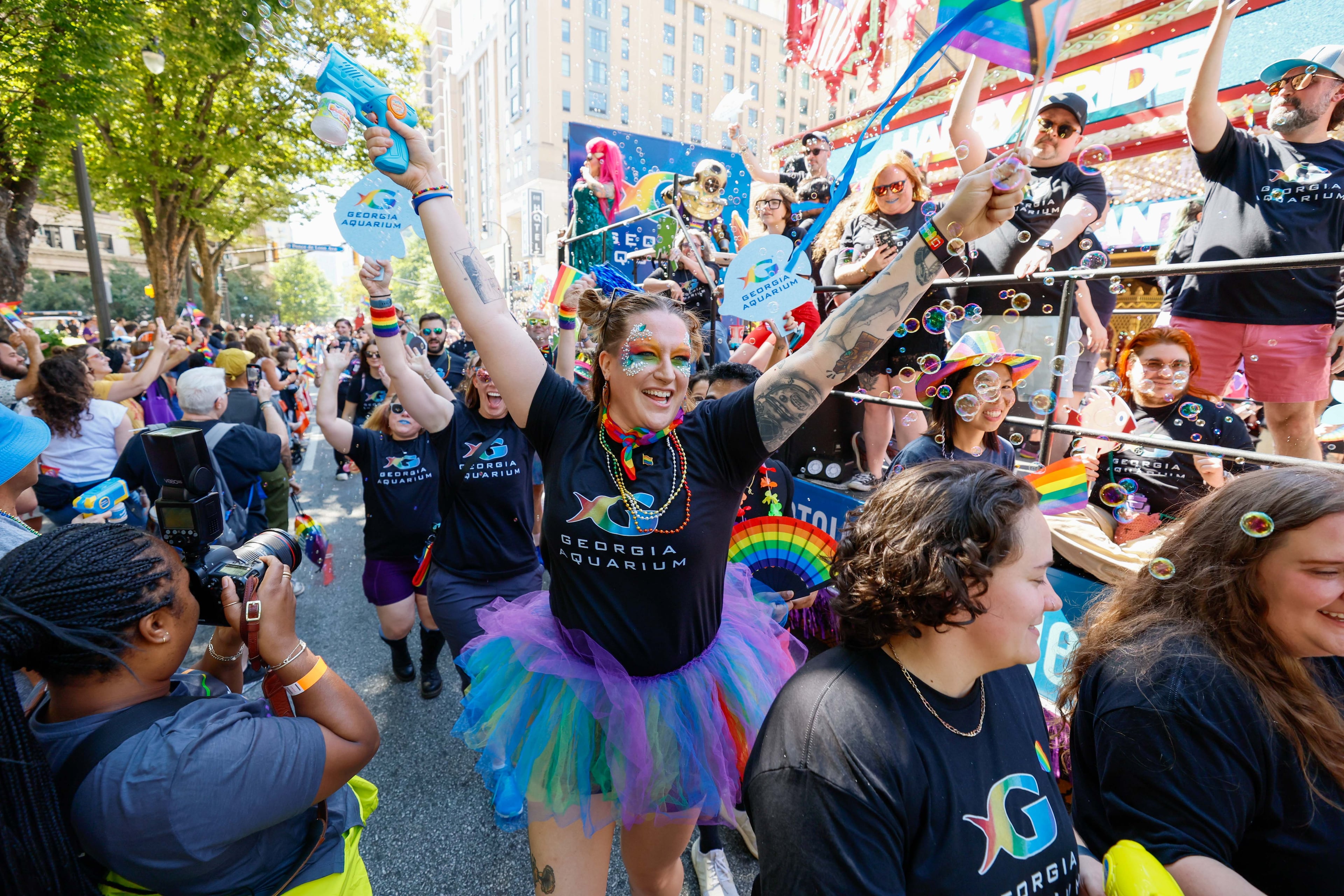


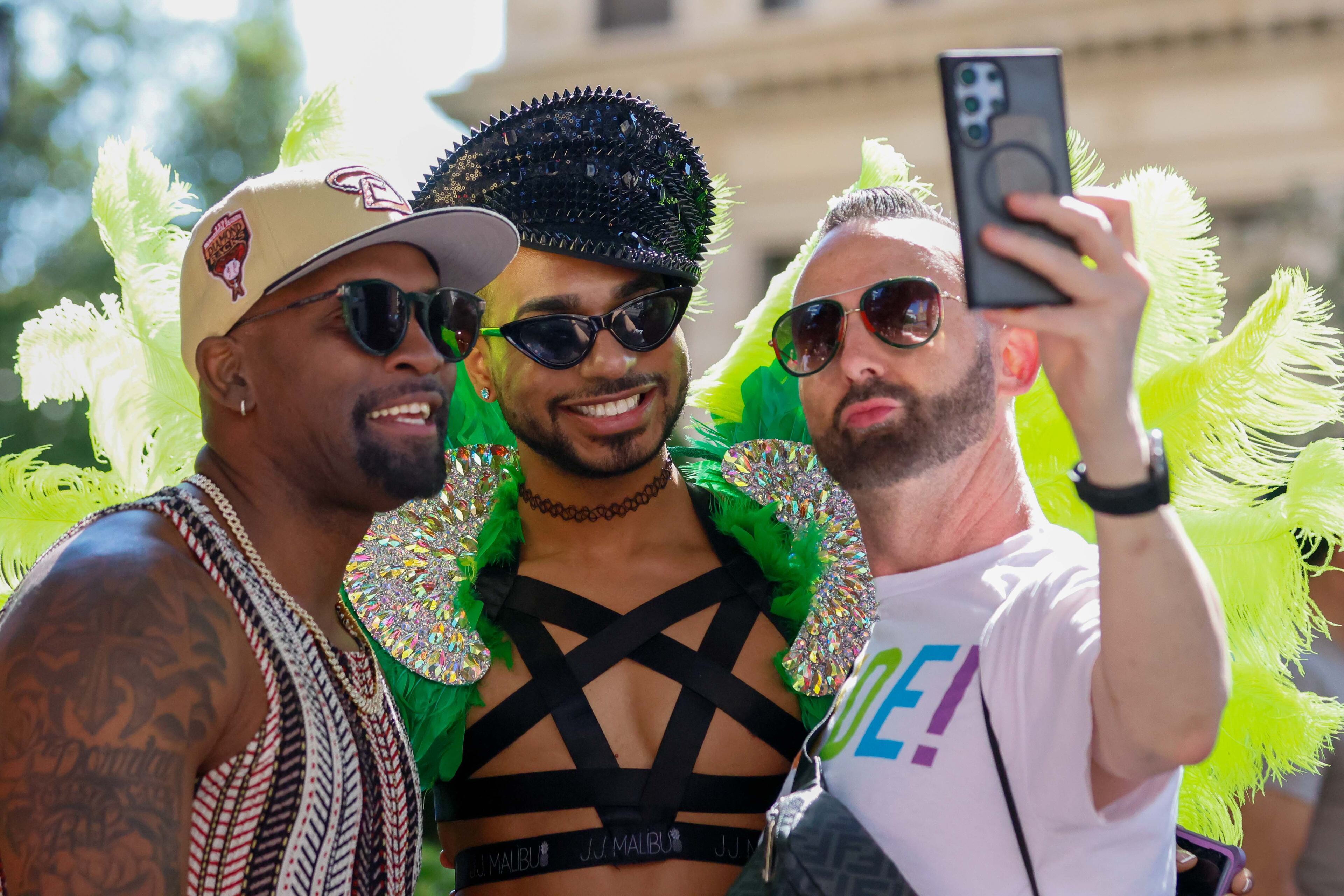


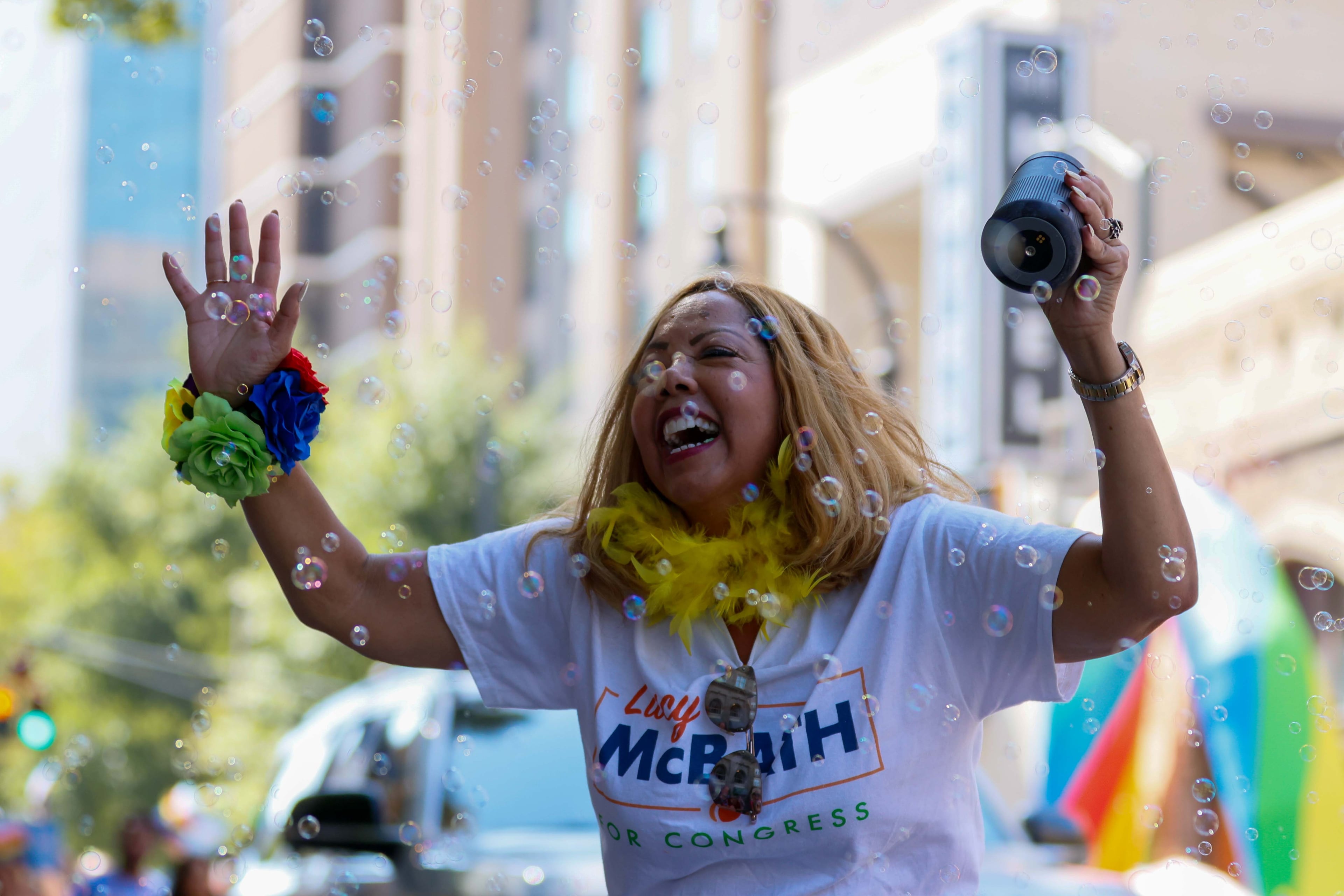




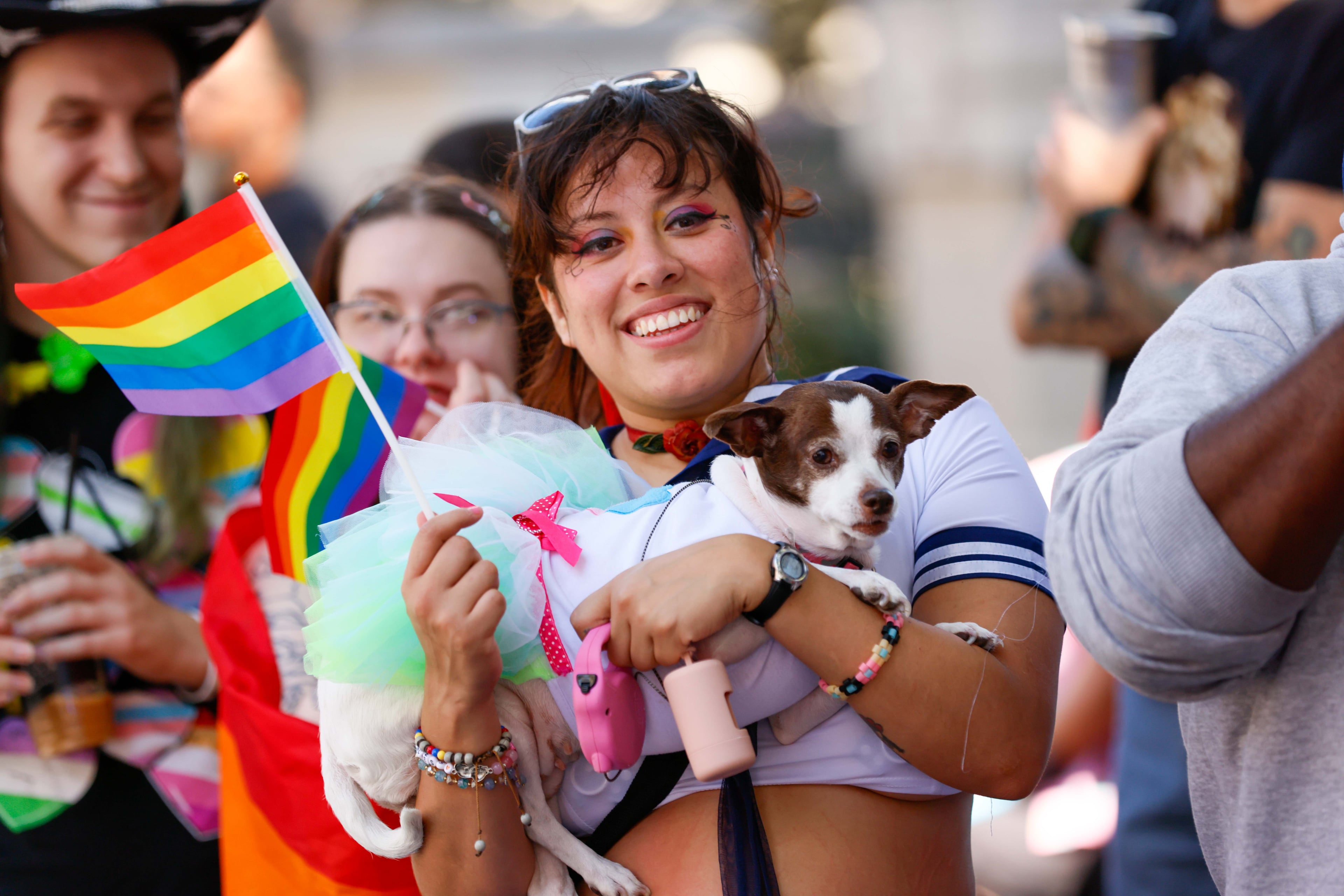

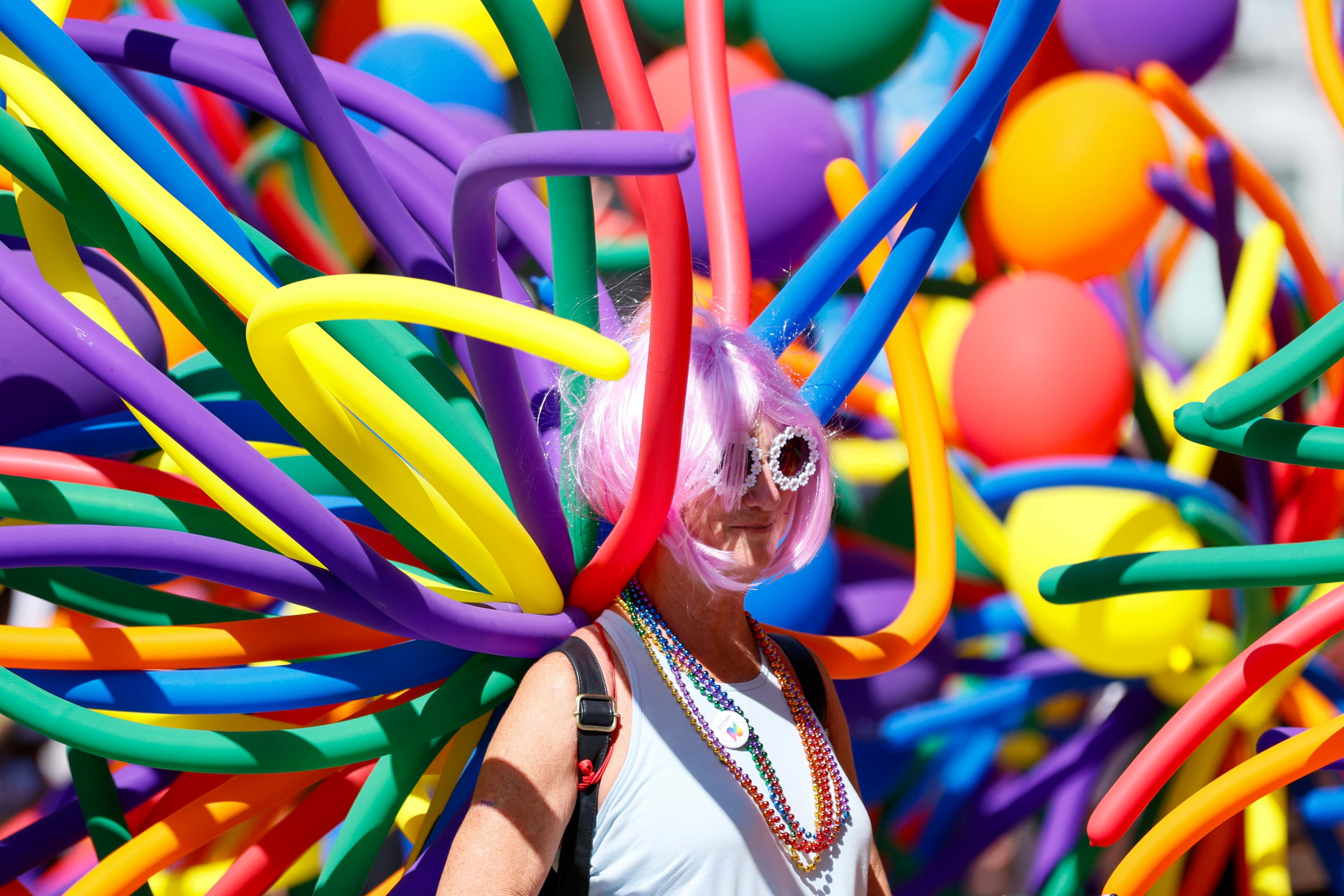

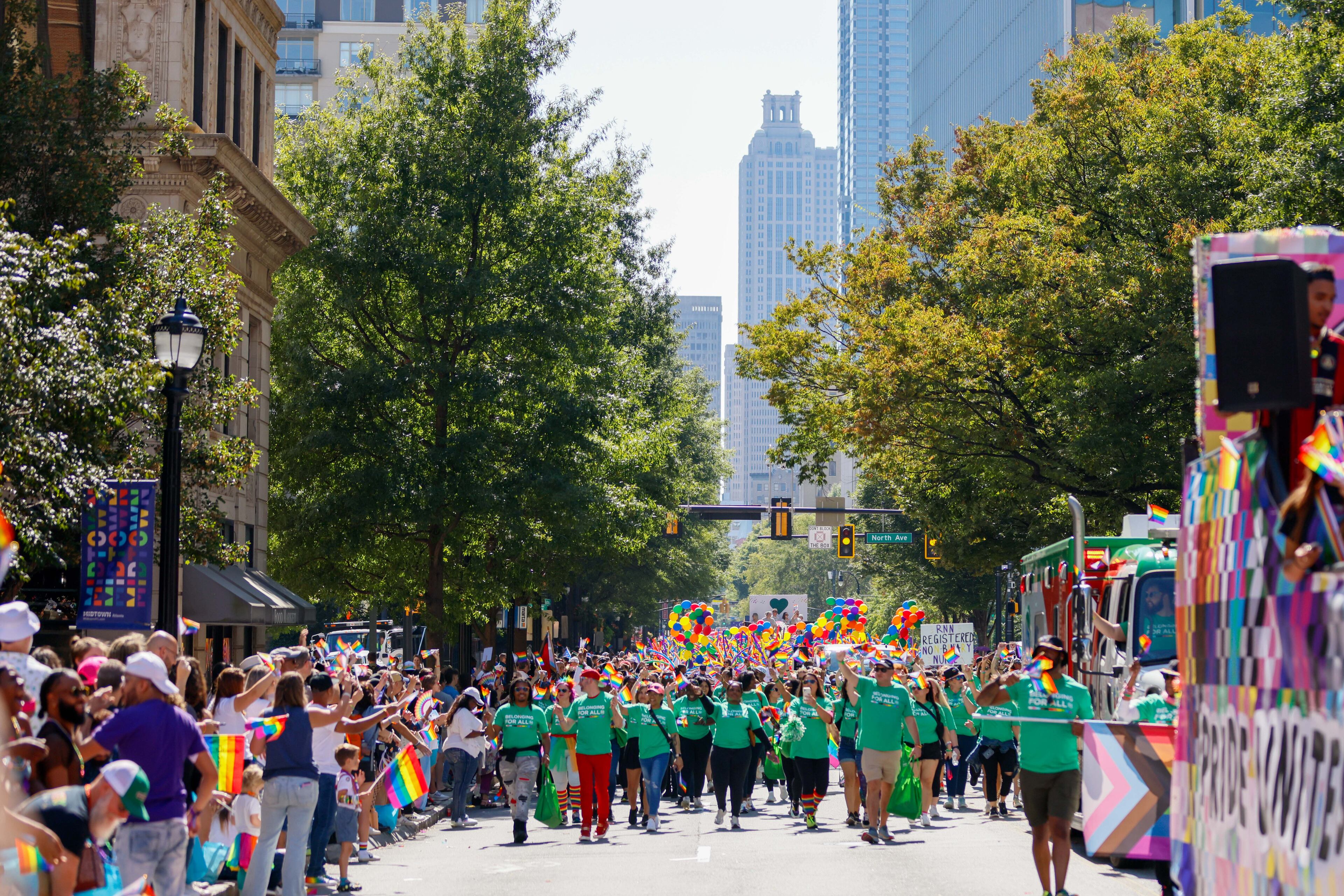










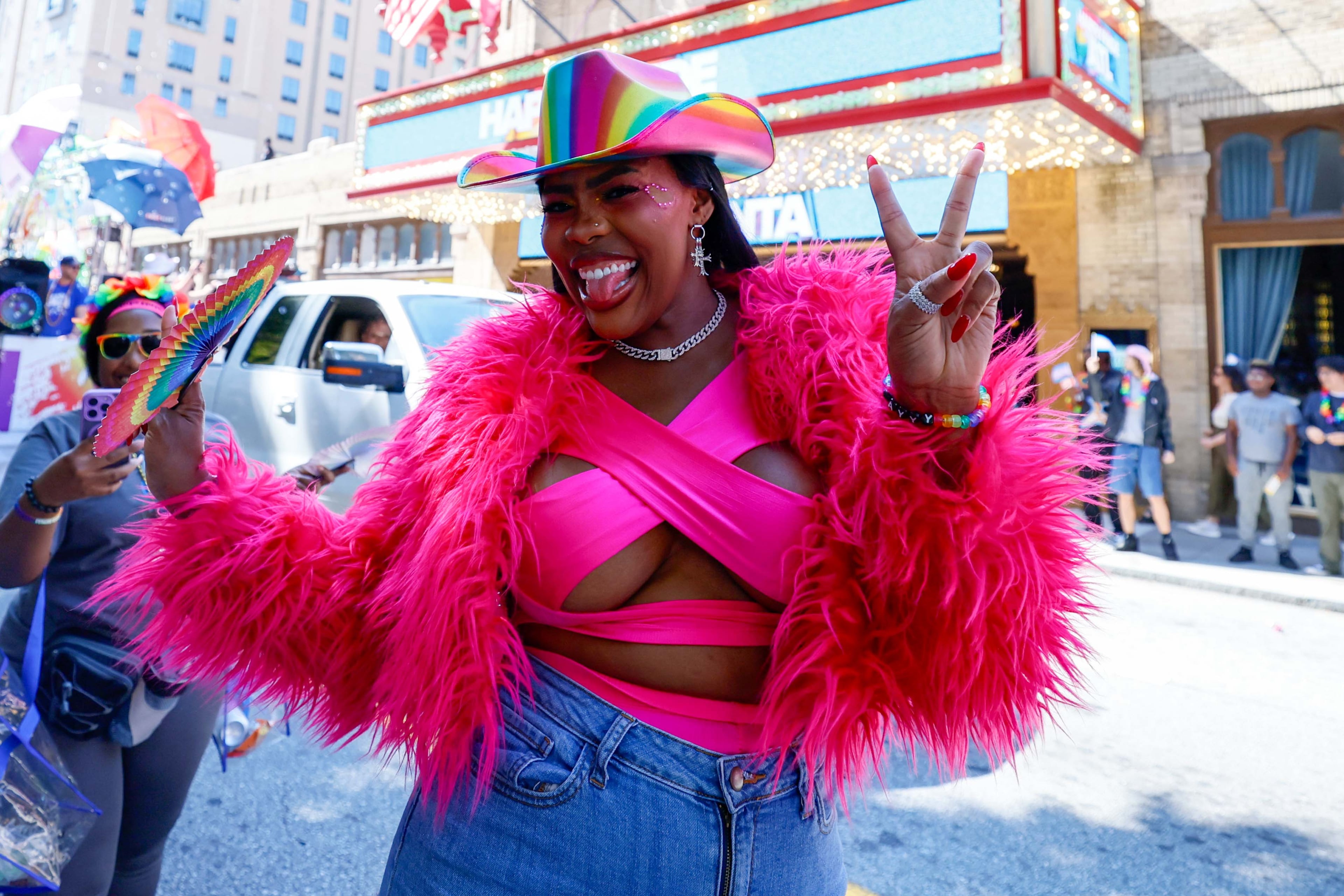
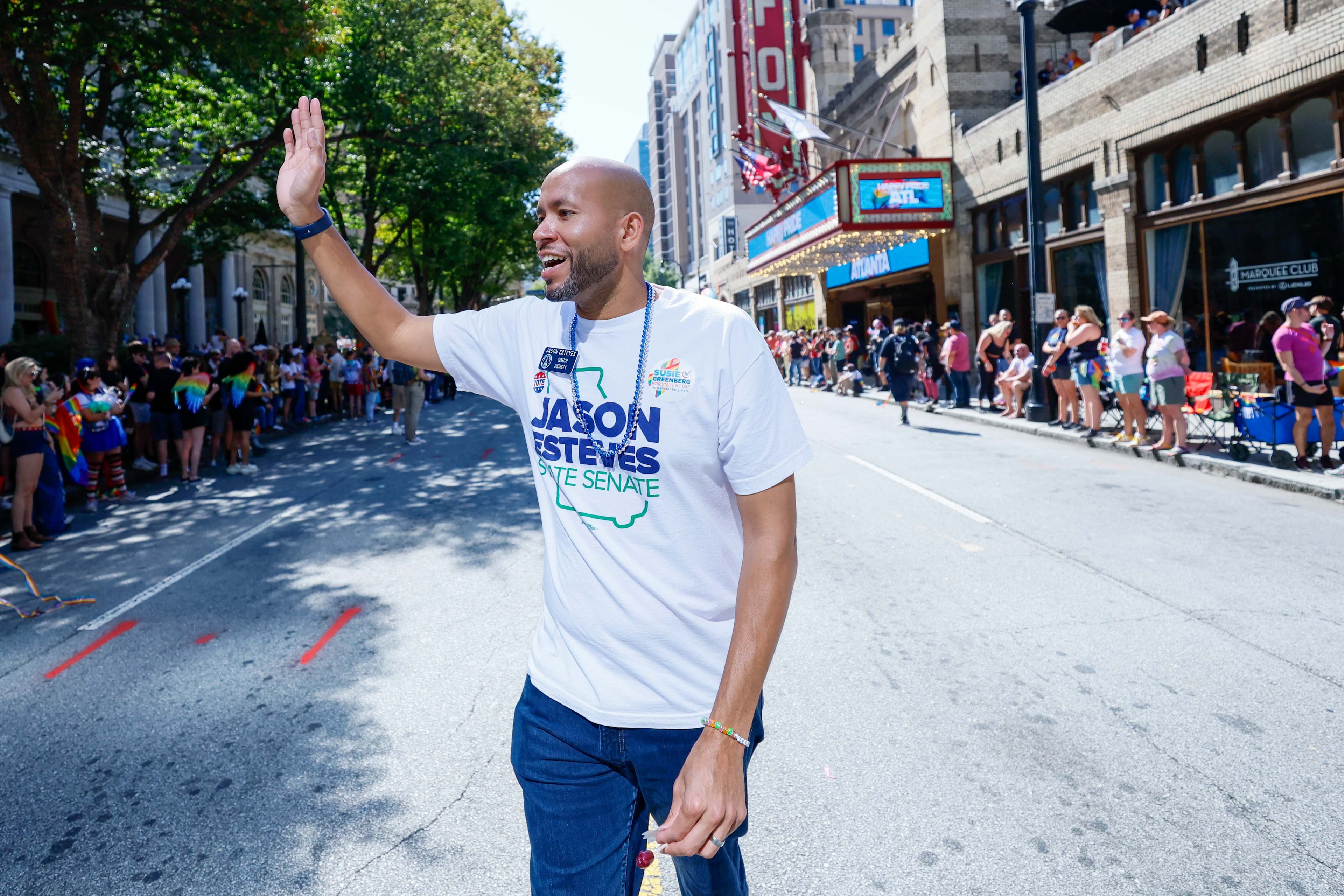







On Sunday at noon, an estimated 100,000 people lined the sides of Peachtree Street in Midtown Atlanta, gathering behind steel barricades, setting up lawn chairs next to coolers of cold drinks, and piling into bars and restaurants to watch the 2024 annual Pride Parade.
Ever-changing music played from parade floats, cars and marcher’s bluetooth speakers, elevating the mood as companies, political organizations, nonprofit organizations, marching bands and clubs paraded, group-by-group, down the street for more than three hours of festive spectacle.
The parade is organized by the Atlanta Pride Committee, Georgia’s oldest nonprofit agency serving the LGBTQ+ community, and is just one part of a whole weekend’s worth of festivities and marches all centered around advocating, educating and supporting gender and sexual diversity.
Some parade attendees wore dazzling, colorful costumes, some raised up politically-charged posters, while others wore casual street clothes. Young and old alike cheered on the parade of floats, classic cars, fire engines, police cars, motorcycles and marchers to, in most cases, show support for the LGBTQ+ community. The crowd was a rainbow of diverse people, each with a story to tell. Meet some of the faces in the crowd:

Parade OGs
Andrea Nedelsky has made it to almost every Pride Parade in Atlanta over 31 years. At this year’s, she wore an original 1993 T-shirt from one of the earlier parades. She sat next to her wife, Maryann Hopper. While the couple has been together for 40 years, they were not able to legally marry until 2009 when Massachusetts allowed them to.
Nedelsky, who used to march in the Dyke Parade as a character called “Mighty Dyke, Keeper of Lesbian Secrets,” has had a front-row seat to watch society change through the decades.
“In 1973, we were still considered deviants until they removed us from the psychiatric list that said we could be normal people,” she said. “So those were some of the first Pride parades. They were more in your face — saying we’re real people. … They were a lot more outrageous.”
Now, she said, the parade has a much more mainstream vibe. Some people dress casually. Mega brands like McDonald's and Kaiser Permanente, politicians, sheriffs and fire fighters, would probably never have marched in the parade in her early years, she said.
While society has come a long way, Nedelsky said events like the Pride Parade are still critical to avoid moving backward.
“You think of all the changes that have happened … still 33 different states have passed laws on religious grounds that say if they [business owners] don’t want to serve us they don’t have to just because of who we are,” she said. “That’s why it’s still so important. It’s not as much for my generation … it’s for the younger generation not to take for granted the freedoms that we hope they have.”

Younger Blood
Brennan Young has been to a pride parade every year since he was 16. While watching the parade he grew emotional.
“It’s just so good to see people get to live loudly,” he said. “I feel like so often queer spaces are set to the side or they’re peripheral or they’re always around something. And it’s the one weekend a year that we truly get to shut down the road. We get to be the traffic.”
Seven months ago, Young and his husband were married. Last year they came to the pride parade together. It was his husband’s first pride parade.
“He walked with the gay men’s chorus. To get to see him — who had so much struggle growing up, dealing with his sexuality — to see him celebrate, and be celebrated by the people in the crowd watching him, and also strangers, was really special,” Young said with emotion in his eyes. “I think every queer person struggles in some way because we’re othered constantly. There’s always a perpetual struggle in that.”

Modern Dads
Doug Munster and his husband Brent of 17 years attended the pride parade with their two sons, ages nine and six.
“We just want to show them pride and just support all these amazing people,” Munster said.
Munster and his husband run an adoption charity called Gift of Adoption that supplies grants to help Georgia families adopt children. They also have an Instagram channel that might resonate with other families like theirs called Real Modern Dads.
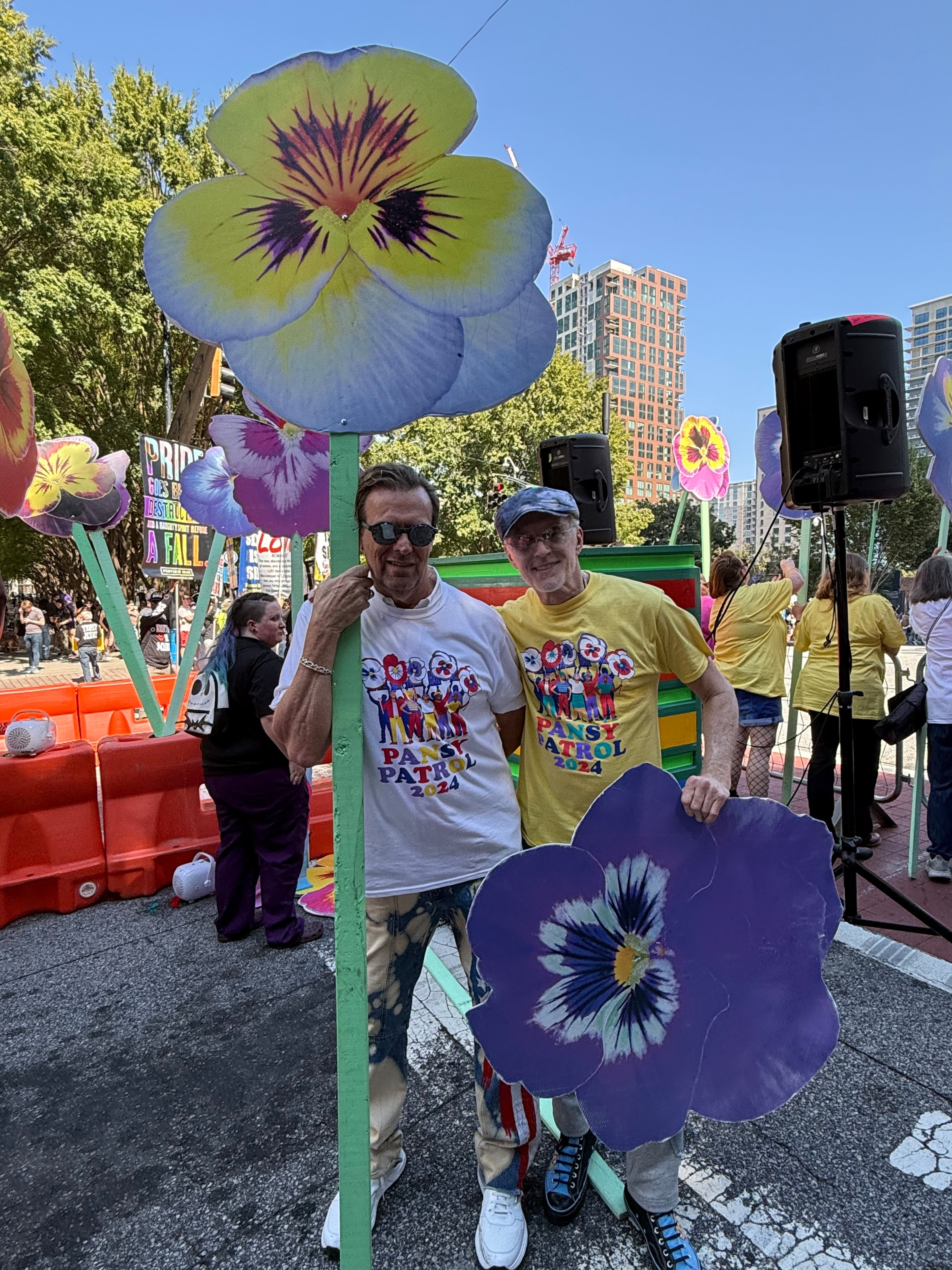

Where the ‘Pansys’ meet the pious
At the intersection of 10th and Peachtree streets where the Pride Parade made its final turn, an orange barricade divided 10th street into two groups. On the left side of the barricade was a crowd of religious protesters holding signs with phrases like “homo sex is a sin” and “how can ye escape the damnation of hell?”
On the right side were a group of people raising colorful cutouts of pansy flowers on green stem sticks. This group, called the Pansy Patrol, was started 15 years ago by Don Purcell and his partner Thom Baker when the couple witnessed a group of religious protesters hollering at the pride parade.
“I was like ‘we have to figure something out’,” Purcell remembered. “We had handmade ones [pansy signs] at the beginning. We went down and said ‘If they come back, we’re going to go down there with our Bloody Marys and we’re going to block them out. They came back and we blocked them out.”
The Pansy Patrol, Purcell said, “is a peaceful act of love.”
“Basically, it’s that simple. We’ve been doing it for 15 years and every year we show up and we just promote love and diversity and block out the unfortunate attendees,” said Purcell referring to the protesters standing next to the group.
While Purcell merely tries to ignore the protesters now, at first he was bothered by them.
“What hit me was why are they coming to my celebration and trying to promote hate under the guise of religion when the religion that I know, my spirituality, has nothing to do with hate. It only has to do with love and accepting people for exactly who they are,” Purcell said.
One of the religious protesters, however, disagreed that his group’s message is hateful. A senior man from Alabama who said he is a “born-again, spirit-filled, speaking-tongues-with-the-Holy-Ghost” Christian, declined to give his name or have his picture taken, but did agree to talk. He explained why he feels passionate about traveling with the group, which hailed from multiple states across the U.S. and attends many pride parades.
“Because we see Satan deceiving the multitudes and people are going to hell by the boatload. We are concerned about people’s souls,” he said. “They’re going to give an account for their lives and we don’t want their blood on our hands, so we’re warning them. … It’s very, very sad. … We’re very grieved. … We’re here because we love them enough to care for them that they would get born again, repent of their sin, turn from their wicked ways and make their way to heaven.”

Another kind of Christians
Brian Nietzel and Kelly Mellen stood about a block up from the pansy-pious standoff. Their poster board sign caught the eye after seeing the religious protesters.
“I’m sorry some Christians don’t get how amazing, badass and perfect you are,” read the sign.
Nietzel, who held the sign, also wore a short that said “I’m Sorry. Making Things Right” with a swerving rainbow as the S in sorry.
“I think it’s very important to show people love, to show that God is love, but also to be on the right side of history,” explained Nietzel who runs an organization called Making Things Right. “I think for too long we’ve been complacent. We’ve been silent and we don’t want silence to indicate that we don’t support God’s love in this way.”
Nietzel is gay but due to the Christian environment he grew up in didn’t come out until his late 30s.
“Me and God figured that out and I had a change of heart and I knew that he [God] was OK with me being gay. So I have a personal catalyst,” Nietzel said.
Mellen’s daughters were her motivation for spreading her message.
“They are 21 and 18 now. And while I’ve always been supportive, they really taught me I need to be more vocal. … I’ve learned that so many LGBTQ people struggle with their mental health, with their self-worth, the rates of suicide are higher,” Mellen said. “If I can even be a glimmer of love in this world, then maybe that impacts somebody for the good.

Fanny’s got a message
Flavio Moreno who is originally from Brazil and has lived in Atlanta for 13 years came dressed as the persona Fanny.
Fanny, Moreno said, carries a message.
“It’s to show people there are different people and everybody needs to be loved,” Moreno said. “It doesn’t matter what you like. You like sushi. I like pasta. We are still people anyways, and people tend to do different things. People tend to overthink about stuff and it’s so simple. We are all humans — just love each other.”
Flavio stood strategically next to the protesters.
“I mean, I am provoking them a little. I mean in a sense,” Moreno said smiling.
Moreno, who grew up Catholic, said people should learn to think for themselves.
“I think people should not be able to be introduced to religion until they’re a certain age. They’ve been brought up to believe certain things. And it’s so ingrained in them,” Moreno said. “It’s not their fault that they were brought up like this, but it is their fault that they have to think and they don’t.”
